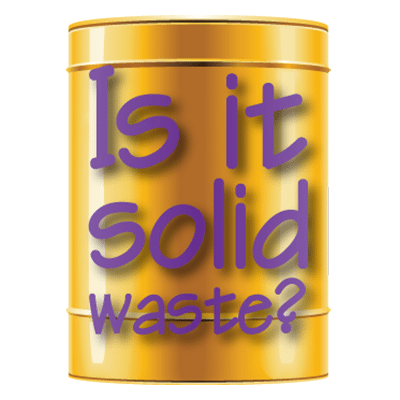
When you hear the term “solid waste” you probably think it means exactly what it sounds like, a waste that is solid as opposed to liquid or gas. Interestingly enough though that is not what it means at all. The legal definition of “solid waste” actually has nothing to do with physical form. Rather, it deals with whether or not the material is a “waste.”
RCRA §1004(27) defines a solid waste as, “any garbage, refuse, sludge from a wastewater treatment plant, water supply treatment plant, or air pollution control facility, and other discarded material, including solid, liquid, semisolid, or contained gaseous material, resulting from industrial, commercial, mining, and agricultural operations and from community activities.”
The definition found in 40 CFR §261.2 is a little less extensive. §261.2 defines a solid waste as any material that is discarded by being abandoned, inherently waste-like, recycled, or a military munition identified as a solid waste. These four categories are explained further below.
What is an “abandoned waste?”
As you might have guessed, an abandoned material is simply one which has been discarded or thrown away. Under §261.2 a material is considered abandoned if it is disposed of, burned, or incinerated. Additionally, any material that is stored before or in place of disposal, burning, or incineration is considered abandoned.
What does it mean for a material to be “inherently waste-like?”
Regardless of whether or not they are recycled in some way, there are some materials that are always considered solid wastes under §261.2. Because the materials may still pose danger to human health or the environment after recycling, they are considered inherently waste-like and do not qualify for any type of recycling exemptions. According to the EPA, “examples of inherently waste-like materials are the dioxin-containing listed wastes F020, F022, F023, F026 and F028.”
What kinds of materials are recycled?
The EPA has three categories for a “recycled material.” According to §261.1 a material is recycled if it is used, reused, or reclaimed. Each of the three categories has a specific regulatory definition. So, a material is reclaimed if it is processed to recover a usable product or if it is regenerated. An example would be regeneration of spent solvents. A material is used or reused if it is either used as an ingredient in an industrial process to make a product, such as distillation bottoms from one process being used as feedstock in another process, or if it is employed as an effective substitute for a commercial product. For example, spent pickle liquor can be used as a sludge conditioner in wastewater treatment.
How and when do military munitions become solid waste?
RCRA in relation to military munitions was a somewhat controversial topic until February 12, 1997, when the EPA finalized a rule that specified when unused and used military munitions are considered discarded and become solid wastes (62 FR 6622). It was decided that unused military munitions would be considered solid wastes once they were removed from storage for disposal or treatment, when they were leaking or in any way deteriorated so they could not be recycled or reused, or when they were declared a solid waste by an authorized military official.
Unused munitions that are repaired, recycled, or reclaimed, are not considered solid wastes, nor are they considered solid wastes while in storage in demilitarization accounts (e.g., scheduled for treatment or disposal). Only when these munitions are finally removed from storage for the purposes of disposal do they become solid wastes.
Used military munitions become solid wastes when they are buried or landfilled onsite, or when they are removed from their landing spot for subsequent management (storage, reclamation, treatment, or disposal) off-range.
All information for this blog post was gathered from the EPA Document, Definition of Solid Waste and Hazardous Waste Recycling. As always, this blog post is not intended to be comprehensive and it is always best to check with the EPA and local government for full rules and regulations.
More News From Heritage
-
3/7/25
Celebrating Our Team: Employee Appreciation Shoutouts
Learn about how we celebrated Employee Appreciation Day
-
3/6/25
Accelerating Action: Celebrating International Women’s Day
Learn about how we're celebrating International Women's Day
-
2/21/25
Heritage Announces East Liverpool, Ohio 2025 Environmental Grant Program
Learn about our East Liverpool Ohio grant opportunity!
-
2/18/25
Heritage Environmental Services Announces James (Shelby) Marlow as Chief Financial Officer
Heritage Environmental Services announced today that James (Shelby) Marlow will join the organization as Chief Financial Officer.
-
1/31/25
January Community Engagement Initiative: Home/Work Energy Reduction
Learn about our January community engagement initiative
-
1/29/25
Heritage Environmental Services Announces Chris Ebeling as Chief Commercial Officer
Heritage Environmental Services announced today that Chris Ebeling will join the organization as Chief Commercial Officer.
-
1/28/25
Heritage Environmental Services Addresses Industry Challenges with New State-of-the-Art Shredder
Heritage Environmental Services announced a new state-of-the-art shredding unit.
-
1/7/25
Navigating e-Manifest: What You Need to Know About Hazardous Waste Compliance
Learn about the e-Manifest Third Rule changes that begin January 22, 2025







